Event Review: Can Better UX Improve the NHS?
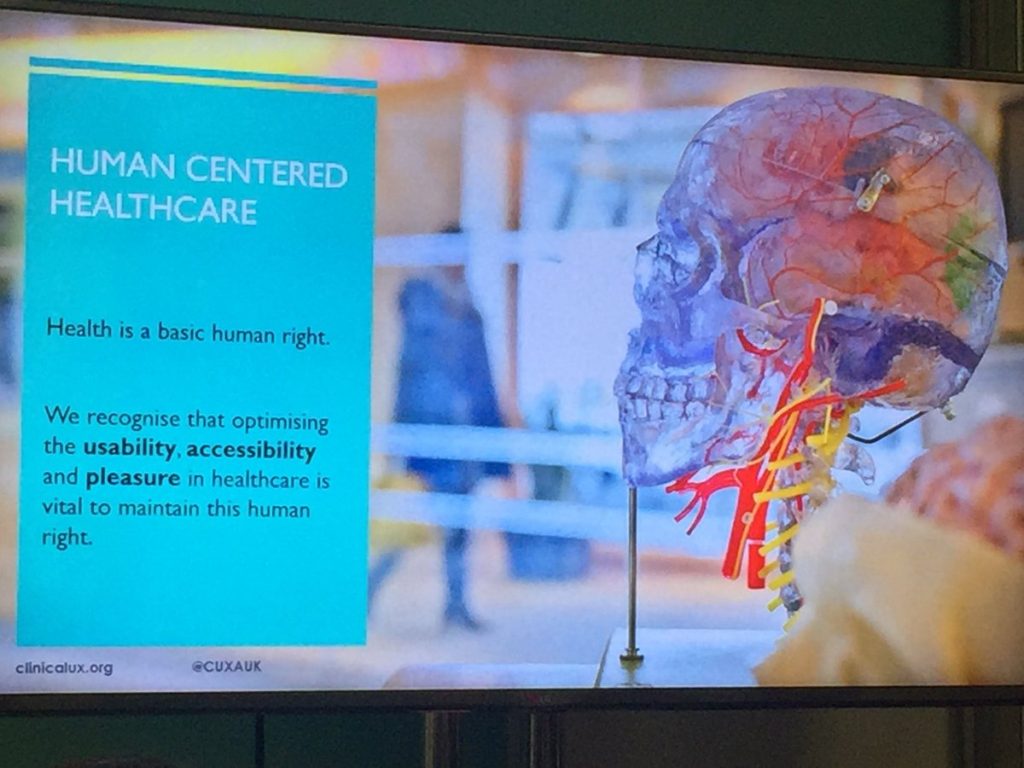
[et_pb_section admin_label=”section”][et_pb_row admin_label=”row”][et_pb_column type=”4_4″][et_pb_text admin_label=”Text” background_layout=”light” text_orientation=”left” use_border_color=”off” border_color=”#ffffff” border_style=”solid”]
Off to a great start
On Wednesday November 30th, the CUXA had its first London event at the offices of Webcredible. The question up for discussion; “can better ux improve the NHS?”. It was an exciting opportunity to meet founding and early members, and enjoy a slice of pizza!
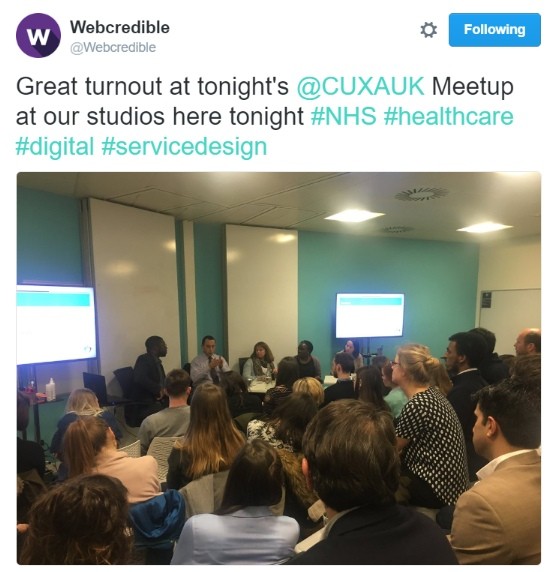
There was certainly a lot of us! 65 to be precise so it was a full house. About ¾ of the audience were UX Specialists, the reset being clinicians. Amongst the clinicians, a few had left full time clinical practice to work in IT exclusively.
The event kicked off with a short talk from me about the CUXA and our mission to improve healthcare UX across the globe. I then discussed at a high level some key statistics about the NHS.
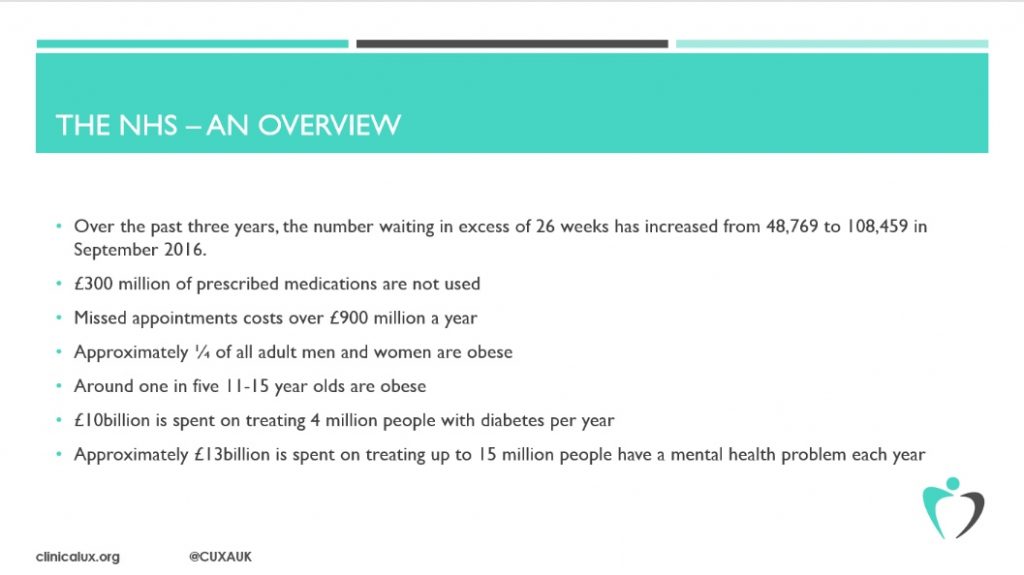
Panel of Experts
I then introduced the esteemed panel of experts
- Dr Guy Gross MBBS– Innovation Consultant, CEO of Patient Activation Centres and former Innovation Delivery Lead at Imperial College Health Partners
- Elisa del Galdo BS, MS– Head of Customer Experience at Blue Latitude Health
- Dr Dayo Ajayi-Obe MBBS SM(Harvard) FRCPCH – CEO & Founder of QCAREDOCS and Consultant Paediatrician at Imperial College Healthcare NHS Trust
- Kristen Allin – Digital Experience Lead at NHS England
The discussion opened with the most important question “Can better UX improve the NHS?” Elisa and Guy gave their answer quite quickly which was “yes and no”. They both elaborated highlighting that there are more problems than just having better user experience, use of technology or even new services. Guy explained that that behaviour change is complex, but a major behaviour that needs to change is the way patients care for their own health.
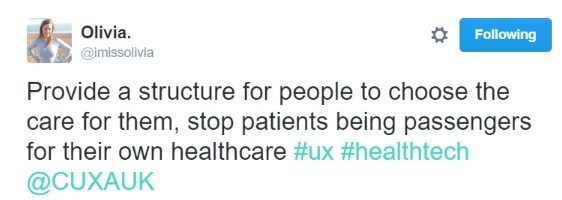
We need to do more research
We heard from Kristen about NHS England’s efforts to have a formal system in place to assess apps used by patients. Most apps are not considered medical devices, so do not go through a thorough, formal process before they can be used. But there is a need for apps to be regulated as many claim to have health benefits which have not been tested, and we don’t know what apps are doing harm. With that said, many members of the audience with Dayo when she suggested that we ask people about their experience with apps as they can help us know which apps are useful and should “prescribed” to patients.

Working collaboratively is key to great UX
More was discussed about the challenges within the NHS. This included the fact there was not many UX practitioners within the NHS and the concept of design thinking was still very new. Digital health itself and the use of apps to improve health and well-being is still very much in it’s infancy. Accessing clinicians to conduct meaningful research is difficult as they are often too busy, and such research can be very expensive.

Then we started talking about how things could get better. We acknowledged that the NHS alone cannot do everything and we need outside help. One of the obstacles to, raised by Guy, is the mindset of rejecting solutions that are not local, as the NHS in his opinion doesn’t always accept foreign products and solutions. To overcome this, he explains the need to have stakeholders included in the creation or procurement of new ways or working or digital products, otherwise things won’t get any better. There is also a need to work with professionals and organisations outside of the NHS, particularly start-ups, who can bring innovative ways of working and new solutions in to the NHS. Co-design and working collaboratively is key.

We ended the evening with two short presentations. The first was from senior UI and game designer Paul Hodge who discussed his findings when researching creating a “second life” game for patients in forensic mental health units to help them adjust to life in the real world. He highlighted the importance of user research as so often, as was the case for his own project, assumptions made about your target audience’s desires, expectations and mindset can be way off. The second presentation was from Business Analyst Haroon Ali and Final Year Medical Student Sharaf Sheik-Ali who are at the early stages of creating their own app, Second Opinion. Their solution hopes to solve the common problems of junior clinicians requiring advice from senior clinicians any time of the day or night, or any clinician needing support from a specialist. They received some valuable insight, resources and contacts from the panel and members of the audience.
A successful evening
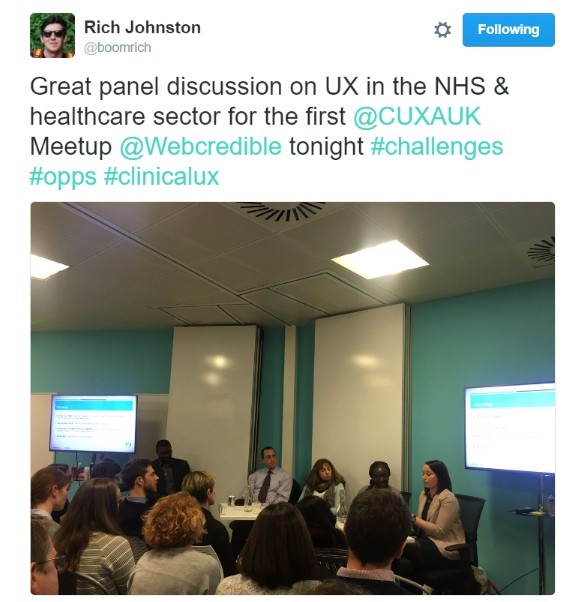 All in all, it was a very successful evening. The passion of the audience and panel members alike was palpable. Feedback findings make it clear that the audience are hungry for a future event and would recommend the CUXA to friends, family and colleagues.
All in all, it was a very successful evening. The passion of the audience and panel members alike was palpable. Feedback findings make it clear that the audience are hungry for a future event and would recommend the CUXA to friends, family and colleagues.
We even overrun by an hour because the discussion was just far too interesting for everyone! The downside was that there was less time to network afterwards, but with the new Slack group, all CUXA members can continue the conversation. Don’t you just love modern technology!?
Thanks again to Webcredible. They gave us a great space to use and some awesome pizza!

We look forward to seeing you at the next event!
[/et_pb_text][/et_pb_column][/et_pb_row][/et_pb_section]



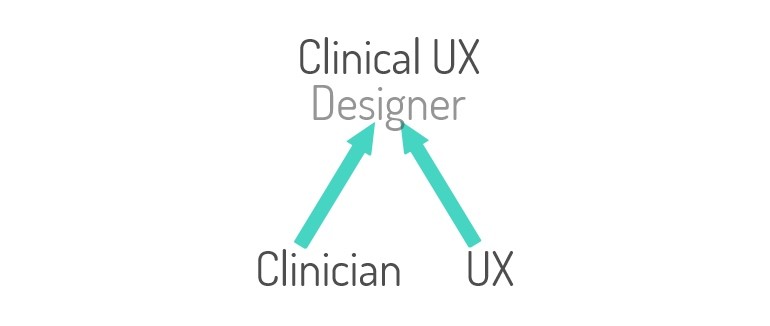




Responses